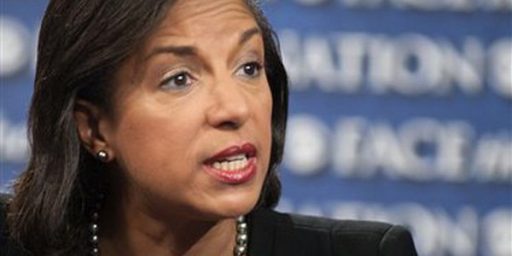Is Condi Rice Dumbed Down?
Yes, according to Tibor Machan, one of her colleagues at the Hoover Institution:
Rice Dumbed Down (Free Market News Network)
Several years ago I used to attend quite a few presentations at the Hoover Institution on War, Revolution and Peace – a Stanford University think tank – by such famous and prominent conservative folks as Alexander Solzhenitsyn, George P. Shultz, Martin Anderson, and Condoleezza Rice. They were and some still are very active scholars there.
Dr. Rice, of course, was just confirmed as this country’s Secretary of State. And what seems to be something worth contemplating is just how much smarter Dr. Rice appeared when she gave her presentations at those Hoover meetings than ever since she has joined the administration of George W. Bush.
Especially during her recent confirmation hearings, this scholar, who could communicate complex ideas in excruciatingly accurate yet clear terms, sounded like she had been deliberately coached to appear to be a simpleton. I do not recall specifics now but it was remarkable how often she resorted to slogans, banalities, clichés and such while she was being questioned.
Lest his essay comes across as pure character assassination, Machan attempts to make a larger point about big government. Its libertarian flavor is reminiscent of Reason Magazine, which he co-founded:
[…] Today it looks like the government is so thoroughly involved in the lives of its citizens, there are so many issues that it meddles in, that it needs to sooth the nerves of everyone as it explains what it is doing and why. Government, in short, is not a specialized institution, concerned with certain specific tasks. It is, instead, quite literary [sic] becoming totalitarian, in the sense that the total range of human affairs is now its concern.
In a democracy when this state affairs has been reached, nothing can be discussed in the special vocabulary appropriate to the subject at hand. Everything needs to be discussed in baby talk, since that is the only common language that everyone can be expected to understand.
It looks like Dr. Rice was being told by the spin doctors in the Bush administration to speak baby talk during her confirmation: “Do not use big words, do not use complex ideas, talk simple, dumb it down good. You are talking to everyone all at once.”
While I generally share Machan’s frustrations with an intrusive state, I completely disagree with his assessment of Rice. First, I think that she was adequately substantive, as her opening statement illustrated:
It is neither an accident nor a coincidence that the greatest threats of the last century emerged from totalitarian movements. Fascism and communism differed in many ways but they shared an implacable hatred of freedom, a fanatical assurance that their way was the only way, and a supreme confidence that history was on their side. At certain moments, it seemed that history might have been on their side. During the first half of the 20th century, much of the democratic and economic progress of earlier decades looked to be swept away by the march of ruthless ideologies armed with terrible military and technological power. Even after the Allied victory in World War II, many feared that Europe and perhaps the world would be forced to permanently endure half enslaved and half free.
The cause of freedom suffered a series of major setbacks: communism imposed in Eastern Europe, Soviet power dominant in East Germany, the coup in Czechoslovakia, the victory of Chinese communists, the Soviet nuclear test five years ahead of schedule, to name just a few. In those early years, the prospect of a united, democratic Germany and a democratic Japan seemed farfetched. Yet America and our allies were blessed with visionary leaders who did not lose their way. They created the great NATO alliance to contain and eventually erode Soviet power. They helped to establish the United Nations and created an international legal framework for this and other institutions that have served the world well for more than 50 years. They provided billions in aid to rebuild Europe and much of Asia. They built an international economic system based on free trade and free markets to spread prosperity to every corner of the globe. And they confronted the ideology and propaganda of our enemies with a message of hope and with truth. And in the end, though the end was long in coming, their vision prevailed. The challenges we face today are no less daunting. America and the free world are once again engaged in a long-term struggle against an ideology of hatred and tyranny and terror and hopelessness. And we must confront these challenges with the same vision and the same courage and the same boldness that dominated our post-world war period. In these momentous times, America has great tasks and American diplomacy has great tasks. First, we will unite the community of democracies in building an international system that is based on shared values and the rule of law. Second, we will strengthen the community of democracies to fight the threats to our common security and alleviate the hopelessness that feeds terror.
And third, we will spread freedom and democracy throughout the globe. That is the mission that President Bush has set for America in the world and is the great mission of American diplomacy today. Let me address each of these three tasks. Every nation that benefits from living on the right side of freedom has an obligation to share freedom’s blessings. Our first challenge is to inspire the American people and the people of all free nations to unite in common, to commonly solve problems that confront us. NATO and the European Union and our democratic allies in East Asia and around the world will be our strongest partners in this vital work. The United States will also continue to work to support and uphold the system of international rules and treaties that allow us to take advantage of our freedom, to build our economies and to keep us safe and secure. We must remain united in insisting that Iran and North Korea abandon their nuclear weapons ambitions and choose instead the path of peace. New forums that emerge from the broader Middle East and North Atlantic Initiative, offer the ideal venues to encourage economic, social and democratic reform in the world. Implementing the DOHA Development Agenda and reducing trade barriers will create jobs and reduce poverty in dozens of nations. And by standing with the freed peoples of Iraq and Afghanistan, we will continue to bring hope to millions and democracy to a part of the world where it is sorely lacking. As President Bush said in our national security strategy, America is guided by the conviction that no nation can build a safer, better world alone. Alliances and multilateral institutions can multiply the strength of freedom-loving nations. If I am confirmed, that core conviction will guide my actions.
To be sure, her policy prescription is debatable and her historical account broad, but the logic is sound — certainly far from the “simpleton” accusation leveled in the essay.
Machan’s demands seem unrealistic. First, he compares the hearing to academic conferences, but they’re two very different contexts. In the former, one must be mindful of political ramifications and intent on advancing an agenda: that’s simply the way government — however large or small — works. It isn’t meant to delve into theory, research, or models, and to expect Rice to abide by such conventions is rather naive.
Second, there’s a fine line between condescension and political skill. Just because Rice avoided “special vocabulary” doesn’t mean that she looked down on the public. She may have simply found a more effective way to communicate with a general audience. If given the choice between jargon and plain English, I don’t think it’s such a crime to opt for the latter, so long as the overall message comes across.
Third, I find it rather ironic that a scholar who’s clearly interested in returning power to the people would take such a negative attitude toward “simple” “talk.” If the message can be expressed in such a way that many citizens can understand it, and the messenger follows suit, then isn’t that a sign of respect toward the true holders of power in our society? I think so. Again, there are many ways in which politicians can use “common language” to show disdain toward their constituents. But, as a general principle, it seems like a pretty healthy, democratic practice to try to relate with the citizenry.






The one possibility he doesn’t consider, apparently, is that when one is talking to a room full of first graders, one tends to alter one’s speech patterns. Seems to me the reletive comparison between Doctor Rice and, say, Babs Boxer…
It’s called knowing your audience. What she was going to say was being broadcast around the country. If she were speaking at Stanford with a lot of PhDs, she would almost certainly go from the 5 o’clock news vocabulary to Harvard Law Review vocabulary.
I do not recall specifics now but it was remarkable how often she resorted to slogans, banalities, clichés and such while she was being questioned.
This is a scholar? Making overly broad generalizations about a speaker’s abilities without citing specific evidence?
I’d expect better from someone who had attended so many academic conferences.
Tibor Machan is just another lame libertarian who will call anyone smart if they say things that he agrees with. He teaches at Chapman College and gets a lot of his stuff published by the OC Register. I have never read anything he has written that could be called insightful or smart. It is party line stuff all the way. When Rice was speaking at the Hoover Institute, as a Soviet specialist, I am sure she said a lot of things Machan was completely unaware of but reflected poorly on the Soviet Union. How hard was that to do, given the disaster the Soviet Union was?
Regardless of whether Rice is smart or dumb Machan is not one whose judgement carries a lot of weight in this discussion.
Regardless of whether Rice is smart or dumb Machan is not one whose judgement carries a lot of weight in this discussion.
Ken, that was the best setup for a joke I’ve ever seen.
The punchline, of course, being this: “Posted by: ken”